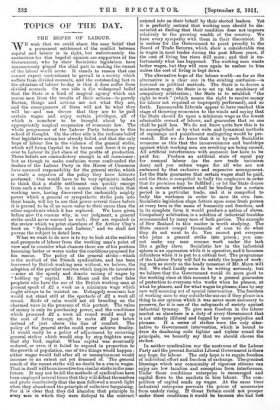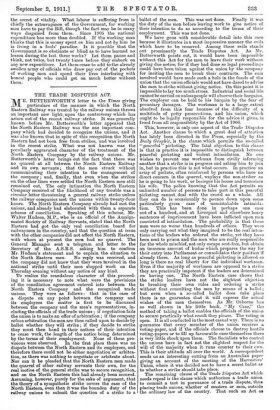TOPICS OF THE DAY.
THE HOPES OF LABOUR.
WE wish that we could share the easy belief that a permanent settlement of the conflict between capital and labour is in sight, but unfortunately the authorities for this hopeful opinion are supporters of the Government, who by their Socialistic legislation have unconsciously played the chief part in making the unrest of the labour world acute. It stands to reason that one cannot expect contentment to prevail in a society which suffers from divided counsels, and the outstanding fact in the situation of labour to-day is that it does suffer from divided counsels. On one side is the widespread belief that the State is a kind of magical agency which can rescue men from the results of their actions—to parody Burton, things and actions are not what they are, and the consequences of them will not be what they will be—and can decree that they are to be paid certain wages and enjoy certain privileges, all of which is somehow to be brought about by an appropriately magical suspension of economic law. The whole programme of the Labour Party belongs to this school of thought. On the other side is the inchoate belief that legislative action has already failed, and that the only hope of labour lies in the violence of the general strike, which will bring Capital to its knees and force it to pay over to Labour its just share of the profits of production. These beliefs are contradictory enough in all conscience ; but as though to make confusion worse confounded the loaders of the Labour Party in the House of Commons have assumed responsibility for the general strike, which is really a negation of the policy they have hitherto professed. One would have to be very optimistic indeed to think that a stable settlement can quickly emerge from such a welter. To us it seems almost certain that working men, having discovered the undeniably mighty power which a general or sympathetic strike puts into their hands, will try to use that power several times before it is proved to be of no more value to their cause than the other expedients which it has replaced. We have given before now tie reasons why, in our judgment, a general strike could never succeed as such ; they are repeated in the review which we print elsewhere of Sir Arthur Clay's book on " Syndicalism and Labour," and we shall not pursue the subject in detail here. What we want to do now is to try to look at the realities and prospects of labour from the working man's point of view and to consider what chances there are of his position becoming better or worse under the conditions proposed for his rescue. The policy of the general strike—which is the method of the French syndicalists, and has been borrowed by British working men without, we believe, the adoption of the peculiar motives which inspire its inventors —aims at the speedy and drastic raising of wages by " holding up " capital. Mr. Mann and the other false prophets who have the ear of the British working man at present speak of £2 a week as a minimum wage which ought always to be insisted on. Unhappily economic law would not stand still at the spectacle of £2 a week all round. Birds of calm would not sit brooding on the charmed wave in the presence of this portent. The value of money is only its purchasing power, and the conditions which procured £2 a week all round would send up the cost of living enough to make £2 just below instead of just above the line of comfort. The policy of the general strike could never achieve finality. It would really be a policy of adjustment by recurring general strikes which would step by step frighten away that shy bird, capital. When capital was eventually reduced, or even if it failed to expand in proportion to the growth of population, one of two things would happen : either wages would fall after all or unemployment would increase to an extent not yet dreamed of. The general result of the recent strike will no doubt be a rise in wages. That in itself willbean incentive toa similar strike in the near future. It may not be till the methods of syndicalism have been employed several times that they will defeat themselves and prove conclusively that the men followed a marsh light when they abandoned the principle of collective bargaining. For it is clear that they did abandon that principle in wary vase in which they were disloyal to the contract entered into on their behalf by their elected leaders. Yet it is perfectly natural that working men should be dis- satisfied at finding that their condition does not improve relatively to the growing wealth of the country. We have every sympathy with them in their discontent. It is useless for the Government to point proudly to the Board of Trade Returns, which show a considerable rise in wages in most trades during the past fifteen years, if the cost of living has risen still more ; and that is un- fortunately what has happened. The working man wants better wages, but they will once again be useless to him unless the cost of living is kept down.
The alternative hops of the labour world—so far as the alternative is a clear one in the existing confusion—is fastened on political methods. The State is to decree a minimum wage ; the State is to set up the machinery of compulsory arbitration ; the State is to establish " the right to work " (which means the right to receive money for labour not required or improperly performed), and so forth. Innumerable Liberals appear to have reached this stage of throwing economics to the winds and saying that the State should fix upon a minimum wage as the lowest admissible reward of labour, and guarantee that no one shall be paid less. We do not know quite how this is to be accomplished or by what wide and tyrannical methods of espionage and punishment malingering would be pre- vented. But we do know that it is by such Socialistic measures as this that the inconveniences and hardships against which working men are revolting are being caused. All artificial interferences with economic law have to be paid for. Produce an artificial state of equal pay for unequal labour (as the new trade unionism does) and you reduce wages for all who are not embraced by that exclusive and expensive arrangement. Let the State guarantee that certain wages shall be paid, and the State is compelled to bully the employers in order that its promises may be fulfilled ; or let the State decree that a certain settlement shall be binding for a certain period in a. particular trade, and it is compelled to bully the workmen in order to save its own face. Socialistic legislation claps fetters upon some fresh person at every turn in the name of humanity and freedom, and in its complete form it would produce a nation of slaves. Compulsory arbitration is a solution of industrial troubles recommended by many men of both parties. The example of New Zealand in this matter is worth studying. The State cannot compel thousands of men to do what they do not want to do. You cannot put everyone who joins a general strike into prison ; you can- not make any man resume work under the lash like a galley slave. Socialistic law in the industrial sphere is an oppression while it is operative, and it becomes ridiculous when it is put to a critical test. The programme of the Labour Party will fail to satisfy the hopes of work- ing men as surely as the heady nonsense of Mr. Mann will fail. We shall hardly seem to be writing seriously, but we believe that the Government would do more good to the working class at this moment by a general guarantee of protection to everyone who works when he pleases, at what he pleases, and for what wages he pleases, than by any new well-meaning act of special intervention. The freedom of working men to stay outside the unions if they please is a thing in our opinion which it was never more necessary to preserve, for it is one of the safeguards of society against industrial tyranny. To give men freedom in the labour market as elsewhere is a duty of every Government that is not utterly illiberal and fogged by mere prejudice and phrases. If a series of strikes were the only alter- native to Government intervention, which is bound to draw its deadening coils tighter and tighter round the principals, we honestly say that we should choose the strikes.
In neither syndicaliAm nor the nostrums of the Labour. Party and the present Socialist Liberal Government is there any hope for labour. The only hope is to regain freedom of individual effort and freedom of exchange. The greatest blessings which any community of vigorous citizens can enjoy are low taxation and exemption from interference. Under those conditions enterprise is encouraged and capital flows to the markets to hire labour. The corn- petition of capital sends up wages. At the same time industrial enterprise prevents the prices of necessaries from unduly rising. If Great Britain could not prosper under these conditions it would be because she had lost the secret of -vitality. What labour is suffering from is chiefly the extravagance of the Government, for working men have to pay the Bill, though the fact may be in many -ways disguised from them. Since 1905 the national expenditure has more than doubled. If the working man thinks that this is money spent on him and not by him he is living in a fools' paradise. Is it possible that the Government is so obstinate or blind as to have learned no lesson during the last three weeks ? Let them pause and think, not twice, but twenty times before they embark on any new expenditure. Let them cease to add to the already swollen army of officials who draw pay out of the pockets of working men and spend their lives interfering with honest people who could get on much better without them.







































 Previous page
Previous page